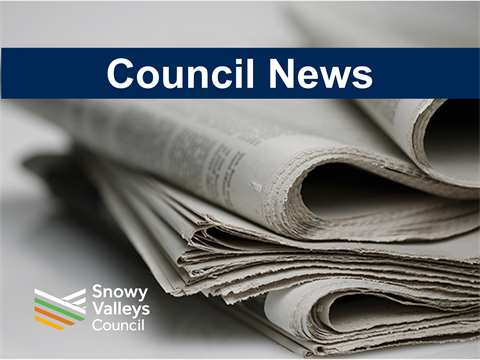New Organics Processing Facility to be Developed.
Published on 29 March 2021

Snowy Valleys Council is looking to take a big step forward towards sustainability as it moves closer to rolling out the household waste sorting system known as Food Organics Garden Organics (FOGO).
Development Application Planning for the construction of the organics processing facility on the proposed site near the Gilmore Transfer Station is now underway following an Aboriginal Cultural Heritage Assessment.
Council’s Executive Director Infrastructure Heinz Kausche said the average general waste bin in the Snowy Valleys comprised more than 40% food waste and garden waste.
“By changing the way we sort waste, the new organics service will ensure that more than half of our household rubbish can be re-purposed into soil conditioning products for use in agriculture and horticulture”.
Mr Kausche said during the early planning stages for the organics processing facility last June a desktop assessment of the proposed organics collection site in Gilmore identified known Aboriginal sites which required further investigation.
“These findings meant that we needed to engage a specialised contractor to undertake an Aboriginal Cultural Heritage Assessment which would accompany the DA,” he said..
In June 2020 a site archaeological survey of the area was undertaken attended by the Archaeologist, representatives from the Brungle/Tumut Local Aboriginal Land Council and Council’s Resource Recovery Officer.
Following the results of the field investigation a test excavation program was undertaken to determine whether archaeological deposits existed. Test excavations were carried out over a period of nine days, spanning August and October 2020.
Council received the final Aboriginal Cultural Heritage Assessment in late January 2021 enabling the Development Application (DA) for the plant to be submitted.
“The next stage for the project is the DA approval for the organics processing plant’” Mr Kausche said.
“Planning and preparation for transition to the three-bin collection service and the new bin system rollout also continues behind the scenes while we await the DA process and approval,” he said.
Council adopted its Zero Waste Strategy in 2019 recognising that zero waste to landfill is the future goal that will create a resilient community where resources are processed and utilised rather than disposed of as waste.
One of the key actions identified in the strategy is the delivery of an organics collection and processing service to improve resource recovery and reduce the amount of waste to landfill.
This project was supported by the Environmental Trust as part of the NSW Department of Planning, Industry and Environment Waste Less, Recycle More initiative funded from the waste levy.
-ENDS-